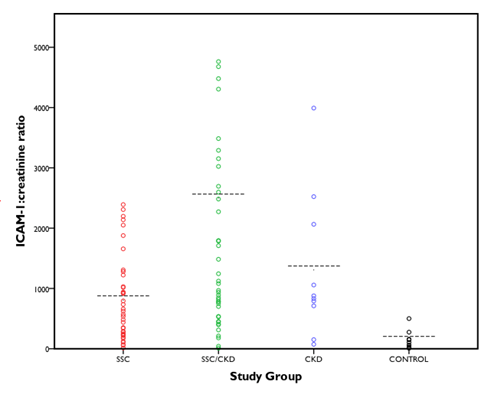Session Information
Session Type: ACR Poster Session B
Session Time: 9:00AM-11:00AM
Background/Purpose: Renal involvement in systemic sclerosis (SSc) includes scleroderma renal crisis as well as progressive organ fibrosis. Detection and management of these disease complications is challenging and there is a clinical need for biomarkers that reflect renal involvement. The immunoglobulin superfamily adhesion molecules ICAM-1 and VCAM-1 are upregulated in affected tissues in SSc and other connective tissue diseases. Serum levels of ICAM-1 and VCAM-1 have been elevated in previous studies, but in some instances this reflects the multi-organ burden of disease and organ-specific analysis may to be more robust.
Methods: We collected urine and serum from 80 SSc patients, with or without renal disease, and compared them with patients with CKD of other causes (n=10) and healthy controls (n=12). We used bead-based multiplex analysis to measure cell adhesion molecule concentrations.
Results were compared between groups by Kruskal-Wallis test. Results: 40 SSc patients had CKD defined by eGFR and urinalysis. Risk factors for renal involvement (SSc-CKD) included diffuse skin involvement and anti-RNA polymerase III antibodies. Serum concentrations of ICAM-1 or VCAM-1 did not differ significantly between SSc-CKD and the three control groups. Urine VCAM-1 concentrations were increased in SSc patients with renal involvement (mean VCAM-1:creatinine ratio 922, SD 953 versus 654, SD 708 for those without renal involvement) but this did not reach significance. Urine ICAM-1 was markedly upregulated in SSc-CKD (mean ICAM-1:creatinine ratio 1601, SD 1394 versus 806, SD 701 for SSc without renal involvement and 1307, SD 1211 for CKD of other causes, p<0.001)
|
Conclusion: This is the first study to examine urinary cell adhesion molecule concentrations in SSc. Our results confirm the potential utility of urine soluble ICAM-1 as a marker of renal involvement in SSc. Together with previous work by our group on urinary chemokines, the finding of raised urine cell adhesion molecules in the absence of raised serum concentrations supports the utility of urine biomarkers in defining localized SSc disease activity. |
To cite this abstract in AMA style:
Stern E, Ong VH, Burns A, Unwin R, Denton C. Urinary Cell Adhesion Molecules As Markers of Renal Involvement in Systemic Sclerosis [abstract]. Arthritis Rheumatol. 2016; 68 (suppl 10). https://acrabstracts.org/abstract/urinary-cell-adhesion-molecules-as-markers-of-renal-involvement-in-systemic-sclerosis/. Accessed .« Back to 2016 ACR/ARHP Annual Meeting
ACR Meeting Abstracts - https://acrabstracts.org/abstract/urinary-cell-adhesion-molecules-as-markers-of-renal-involvement-in-systemic-sclerosis/

